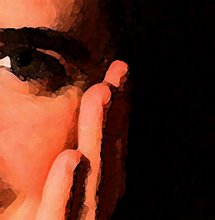Earlier today I attended a meditation workshop at my synagogue called, "Letting Go of the Burning Coal: Anger and How to Heal It", led by Rabbi Alan Lew. The workshop was scheduled to run from 10am-4pm and, like many events held at my synagogue, for reasons that were not apparent it didn't start at the stated time. And because people know that events at my synagogue (even if organized by different groups) tend not to start on time, they have learned not to knock themselves out to arrive on time. And so it goes, creating awkwardness for the people who did arrive promptly and who need to leave (at the original) "on time", when the event might run quite late.
In fact, by the time lunch rolled around we were 30 minutes off schedule. I had intended to leave at 4pm to get to a yoga class and I started to wonder if I'd have to choose between completing the retreat and keeping my commitment to practice yoga three times a week. Poor planning and sliding schedules tend to push a few of my buttons: there is the button of respect - when people don't honor appointments or plans I start to feel that they are not respecting my time and, therefore, not respecting me; and there is the button of irritation - it gets ignited when I believe (rightly or wrongly) that I am in a situation that is being run less than competently. Needless to say, given the increasingly casual world we live in, I'd be better off if I could figure out a way to reprogram these buttons.
Being somewhat, but not completely, self-aware, I ruefully realized that I was in exactly the right place to become angry and annoyed.
Could I learn something about myself and how and why I get angry, I wondered, as I quietly steamed about the schedule during the silent vegetarian lunch. Why didn't the Rabbi shave a few minutes off of lunch (after all, we were not allowed to speak, just eat, so it wasn't social time) in order to make up for the time he lost in the beginning?
It wasn't until 3pm or so that Rabbi Lew actually gave us some instructions on how to work with anger in meditation. "Finally!" my huffy inner voice hissed.
And then he, too, mentioned anger as a form of idolatry, although not in the way that I had heard it described by a woman at Elat Chayyim, where I had spent Yom Kippur. Back in September, a fellow retreatant had mentioned that persistent anger is a way of keeping oneself at the center of things, raising oneself onto a pedestal. But Rabbi Lew had other explanations as to why anger is akin to idolatry. First, by being angry at another person, one gives that person tremendous power over one's life. And fixating on this person puts his or her image in the forefront of one's consciousness, whereas it is God who belongs at the forefront. Secondly, by treating anger as something in the body that must be expelled or gotten rid of, one gives anger a solid form (turning it into an idol) when in fact it is formless. It is energy which we can either suppress (rarely a good idea), express (often a bad idea) or - as we learned today - simply experience and inhabit it, watching it rise and fall. Since we can't exorcise it once and for all, we might as well learn to live with it.
The workshop, despite the 30 minute delay, ended on time, rendering my dilemma moot and making me realize that I had gotten steamed up over...NOTHING...my mind had chosen to chew on the delay much like a dog masticates a bone. My mind does this a lot, the content varying depending on the situation. As a meditator, my job is to figuratively remove the bone before my mind sinks its teeth into it and direct my mind's attention toward something else. Rabbi Lew suggested compassion - can we turn our feelings of anger to thoughts of compassion for the person who is pissing us off? After all, if they are showering us with harsh words and ill feelings, imagine how bad it must be for them.
His recommendation is not new or earth shattering, but it was worth hearing once again, something for my mind to chew on during yoga class while my body rested in downward facing dog.
Sunday, October 21, 2007
Subscribe to:
Post Comments (Atom)




No comments:
Post a Comment